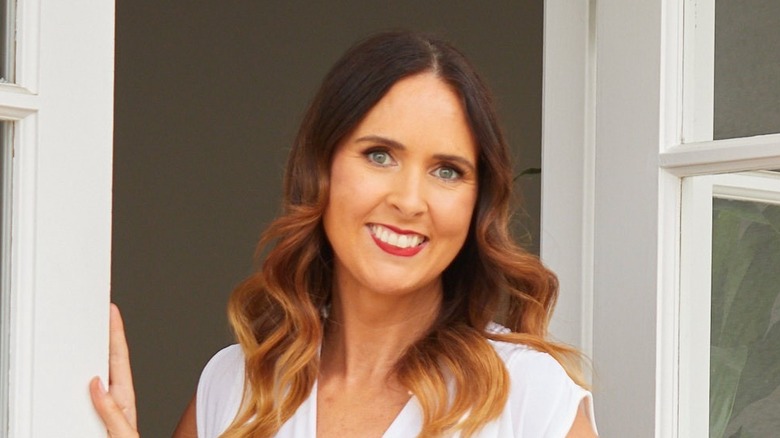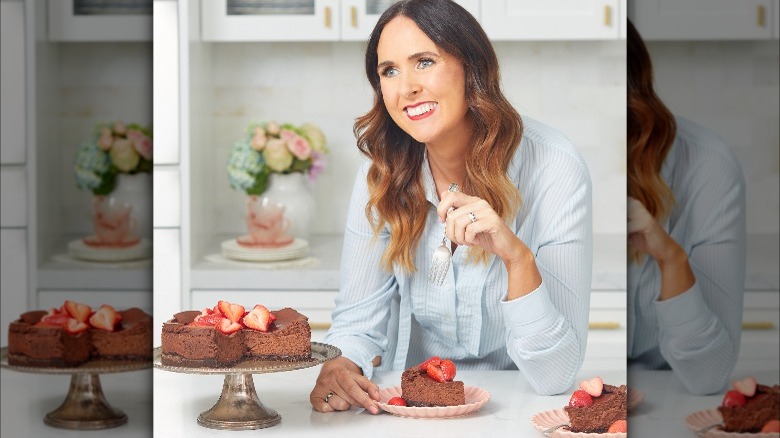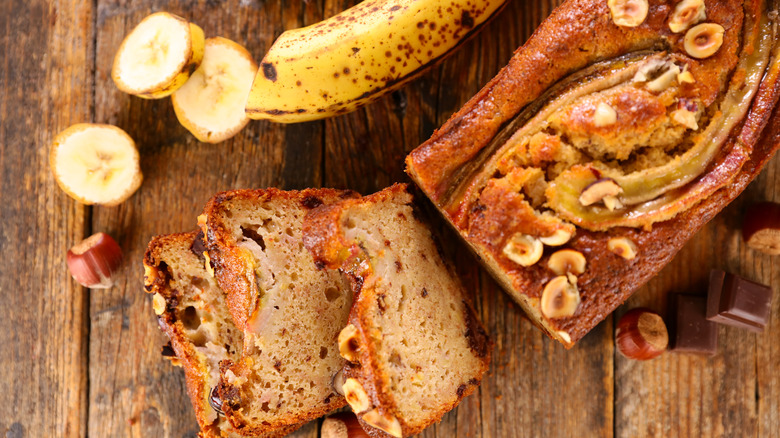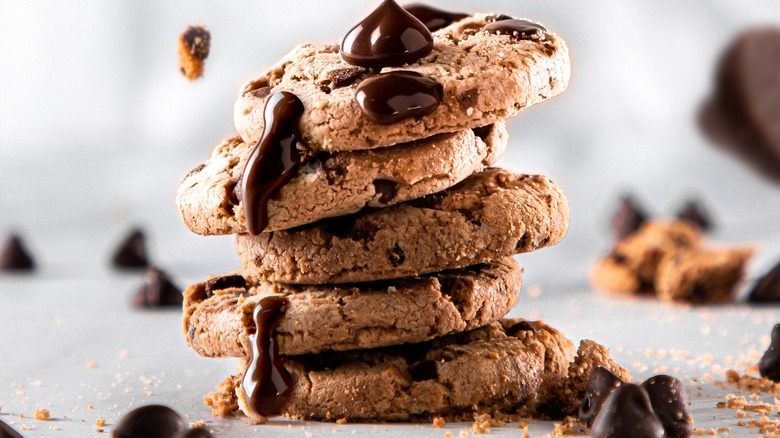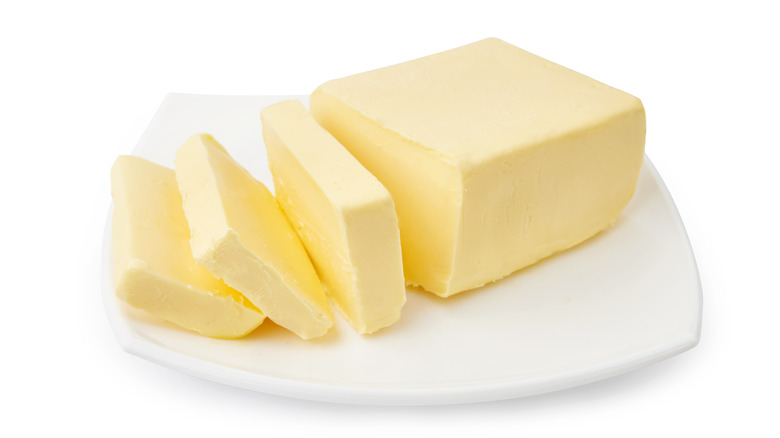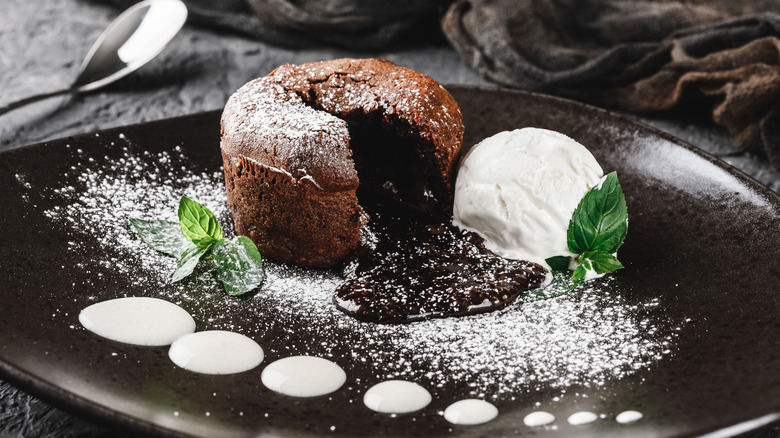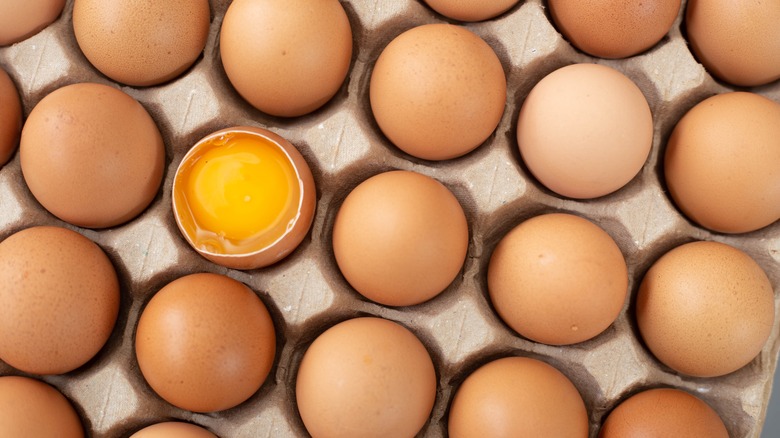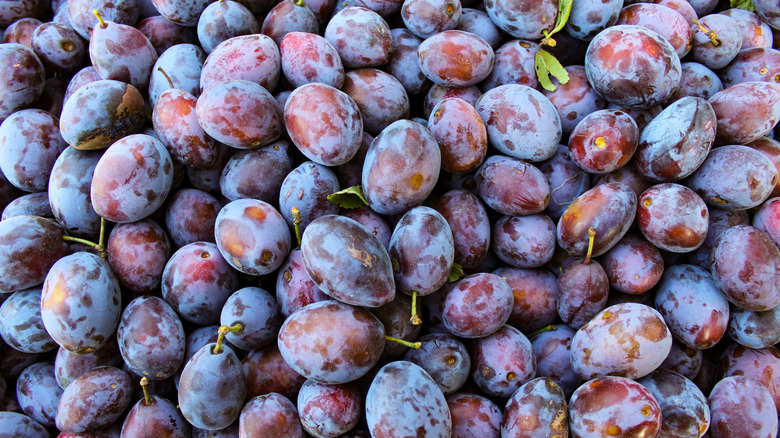Gemma Stafford's New Cookbook Is Bigger And Bolder Than Ever - Exclusive Interview
Looking to get bigger and bolder with your baking? So is Gemma Stafford. The professional chef just launched her second cookbook, "Bigger Bolder Baking Every Day: Easy Recipes to Bake Through a Busy Week," for all of your bread, scone, and dessert needs. For anyone who had a major homemade bread phase, these new recipes are super exciting. In an exclusive interview with Tasting Table, Stafford revealed the key to moist banana bread, how to get the perfect lava cake, and why you should never use chocolate chips in your baking.
The YouTube personality has accumulated 2.7 million subscribers to date, with her videos ranging anywhere from homemade ice cream recipes to behind the scenes cookbook clips. As an Ireland native, Stafford divulged the secret ingredient to scones (which we will be trying immediately). If you are looking to take your baking to the next level and understanding why you should use salted butter in the kitchen, then you've come to the right place.
What inspired Stafford's second cookboook
I would love to talk about your upcoming cookbook, "Bigger Bolder Baking Every Day: Easy Recipes to Bake Through a Busy Week." Could you give me an overview of what inspired the second book?
The inspiration behind this book came from book number one, and came from my years of doing Bigger Bolder Baking online for almost nine years. It was something that we hear from our 8 million fans around the world, which is accessibility, like accessible recipes. That's a word we hear quite a lot. Our recipes are accessible.
We hear from people who are catering for different occasions, different times. They need an easy scone recipe to put in a lunchbox, they need a Victoria sponge for afternoon tea, or they're having a fancy dinner party and they want something a little bit more sophisticated and elegant. I took a step back and realized there's all these different occasions throughout a week that a baker has to cater for.
Also, from book number one, we did get the feedback that there [weren't] many yeasted doughs and yeasted bread and things like that. It was right. I missed that with book number one. I go back to, "What kind of a baker am I, and what needs do I have?" If I have these needs, I'm sure everybody else does too. When I was writing the book, I knew that in Ireland, my mom would make scones on any given day of the week. There's a chapter in the book about weeknight family favorites, because we would always have dessert. It wasn't a special occasion; it was midweek. We would have rice pudding, and apple tart, and crumbles and crisps and stuff like that.
I had the best scone I've ever had in Ireland, so when I was looking through your recipes I was like, "I need to try these because I can't replicate it."
Since writing the book, I have learned, in America, a lot of Irish bakers will use cake flour in their scones. That's a tip the next time you're making scones. I learned this after the book, unfortunately. Cake flour, or a mix of cake flour, [is something] a lot of Irish bakers will do to get that lovely soft scone.
In the book, it's all regular flour?
It's all purpose flour, which gives you a nice soft scone. There is some self raising [too]. We use a lot of self raising flour in Ireland, but I know that our flours are so different in Ireland than they are here, so some people go for that extra soft flour, which is your cake flour.
How to get the perfect bananas for banana bread
I saw in the book that you incorporated several banana breads. How long should you wait for a perfectly ripe banana? What do you normally look for?
In my house, I would speak for a lot of people, is that once I look in the basket, I see it's black, and I'm like, "Yeah, now it's time to make banana bread." The thing about ripe bananas is that they have a lot of more natural sweetness than green bananas. They already have better sweetness and they've got better flavor, and they make for a nice banana bread. They're moist, too. There's definitely a point where you can go too far, but in this age, we're seeing huge surges in [what we're] paying at the grocery store.
In my grocery store, which I thought was fantastic, you can buy over ripe bananas, and they're cheaper. That's something to look out for. Don't buy organic green bananas to make your banana bread. Do a bit of a price check and see if you can buy cheaper brown bananas that are screaming to make banana bread with.
Would you say the key to getting moist banana bread is just to get the right bananas?
The riper bananas, for sure. They're better. All your flavor, texture — everything is all better. The banana bread that you're talking about in my book is a caramelized banana bread. I've never seen a recipe like this before and I thought, "Why doesn't this exist," where you make a caramel, add your bananas, and then build your bread off of that. You get this lovely deep flavor of caramel and bananas, which are best friends, and you get this really lovely moist cake.
Never use chocolate chips in baking
In the book, there is a page that shows some tips and tricks that you have. I read that you wouldn't recommend using chocolate chips or chocolate candy bars in baking. Could you tell me why?
It's a little bit subjective. I very rarely will use chocolate chips. Chocolate chips have stabilizers in them. Chocolate chips often have more sugar [and] different ingredients. Depending on the brand, it's not always the best quality of chocolate. Chocolate chips are designed not to melt. They're meant to be pushed into chocolate chip cookies and for them to hold their shape and not to melt.
I always choose a chocolate bar when I'm doing any of my baking — brownies, chocolate cake, whatever it is. I use chocolate bars in my cookie to get what I call those big bakery style American cookies that have pools of chocolate. You can't get those results with chocolate chips. A chocolate bar is what you have to have for those kinds of recipes.
Using a chocolate bar allows you to pick what percentage and what quality of chocolate you want. If you're buying a 78% dark bar of cocoa with cocoa solids, you know exactly what you're getting. When you're buying chocolate chips, there's very rarely a percentage of what cocoa solids you're getting. You tend to pay less, but get lesser quality.
Always go to the bar. There's great brands out there in the supermarket. Lindt is a great one, it's a good quality. Ghirardelli is a fantastic one. I will let you know my little baker secret. Trader Joe's does a fantastic big five-pound bar of bittersweet 72% baking chocolate from Belgium, which is $5 for one pound and that's absolutely fantastic for baking.
Why Stafford always uses salted butter
It's a common myth that you have to use unsalted butter in baking. That's something that was always ingrained in my head. I saw that you use a lot of salted butter. What is the reasoning?
It's a really good question and I get asked [this question frequently]. A lot of it comes down to preference. My preference is salt. I'll speak for myself, but a lot of bakers that use salted butter will also add salt. It is very common for most people to use unsalted butter and to add their own salt so they can control the levels of salt in your recipe.
I've been a professional chef for 20 years. I have always used salted butter, and I still add in the amount of salt that the recipe says. Salt is flavor. It enhances. Often, people think about salt for savory and not sweet. It's just as important in savory baking. For chocolate and salt, it's almost necessary. Vanilla and salt ... Caramel and salt, it is so important to have salt in everything: in your cookies, in your cakes, your brownies.
I use salt. Side note, because I get asked this question for people: If you do have to be conscious of salt in your diet, then do what suits you. Use unsalted butter or don't add [more] salt in. But just so you know, your baked goods can land a little bit flat without salt. So it's preference. And my preference is more salt.
If you don't necessarily need all of that salt, but you want to use salted butter, could you use a little bit less of the salt that's called for?
Yeah. That's not the kind of thing that will make or break a recipe. That's totally your preference. If you wanted a little bit of salt, if you wanted no salt at all, the only thing it's going to affect is flavor. Some people who are not allowed to have large amounts of sodium would like it less. I like that extra bite of salt. It does make a difference.
We were talking about chocolate chip cookies before. Would you use salted butter for those as well? Is that what you would recommend?
Oh, absolutely. Always salt, especially in my chocolate chip cookies.
How to make sure your lava cake won't collapse
I wanted to talk about the Dulce de leche lava cake. I thought that was such an interesting recipe. First off, what is your method to ensure a lava cake doesn't collapse?
I worked in a kitchen in Ireland and we wouldn't sell a lot of lava cakes. The secret is to get it out to the table as fast as possible, and it will [stay intact]. This doesn't help the home baker, but when you're making lava cakes in restaurants, you have to have somebody there from service to take it out straight away. It collapses often when the person cuts into it, but if you can get it turned out and then to the customer enjoying it straight away, it's less likely to collapse. It's a little bit the nature of the beast, and it starts to sink because it's so delicate, because you have to gently bake it.
It's a little bit of a balancing act of, if you bake it too much, it's going to be a hard cake and it's not a lava cake anymore, but it will hold its shape. If you bake it too little, you turn it out and it starts to collapse because the inside is so gooey. Timing is absolutely essential. Focus on cooking it for the exact right amount of time. A good way to see that in a recipe is that the edges are firmer. It's firm around the edges but still a bit gooey in the middle. Those firmer edges around the sides will hold up your lava cake better. It comes down to the finesse of baking a lava cake.
Stafford talks all things eggs
I'm going to switch to eggs for a minute, because I saw that room temperature eggs are a frequent ingredient throughout your book. How do room temperature eggs affect baking cakes or any dessert, really?
The room temperature eggs, I recommend 99% of the time except for making pastry, because room temperature ingredients blend up so much better together. [When] making a cake, it'll blend into your ingredients better. If you're making meringues, your egg whites will whip up better. Within meringues, making lemon meringue pie, making pavlova, you want room temperature egg whites.
If you're making custard, or if you're making an ingredient where you are adding a hot something into eggs — if your eggs are cold, the hot liquid can shock the eggs and your eggs will cook straight away. If your eggs are room temperature and your liquid is hot, they'll blend together so much better and it's less likely that it'll cook.
For lots of different techniques throughout baking, it's best to have room temperature eggs. I'm guilty of leaving eggs out at room temperature for six hours. I do it all the time. In kitchens, we would have them out all the time. Room temperature could be two hours. Get your ingredients out, leave them there for two hours, or simply take your eggs, pop them in a little bowl of hot water. Let them sit there for five to eight minutes and then take them out and they'll be good to go.
I saw that you recommended freezing egg whites as well. What would that be for? How would you defrost that and use that in your baking?
Because we bake so much for biggerbolderbaking.com, we end up with a lot of egg whites. I freeze them. I put them in a Ziploc. I write on the bag "seven egg whites," or the weight, and I pop them into the freezer flat. I have bags of egg whites. You take them out, you can let them sit at room temperature and let them defrost at room temperature, or you can put them in the fridge overnight and let them defrost in the fridge. Once they're defrosted, you use them the exact same way as you would if they'd never been frozen.
It's the exact same way. You can use them for savory, you can use them for soufflés, you can use them for omelets, scrambled eggs, whatever. For sweets, I always save mine because I make a lot of meringue. If you're making angel food cake, for my recipe, you need 11 egg whites. I use them for things like angel food cakes, or I use them for pavlova, lemon meringue pie, meringues, and macarons.
Do you have any tips for picking out what kind of eggs work best, like cage free, or are regular supermarket eggs okay?
They are. I would say organic eggs are extremely expensive right now. $7 for 12 eggs. I would be a bit of an educated consumer ... cage-free is always good. It's really hard to answer that, because I see so many things online about how people label their eggs and how you think it's one thing and it's not. Be a smart consumer and look at what they're being fed. Look at brands that you can trust and you know make good quality, have good quality eggs and things like that. It's hard, because some people can only afford to buy the much cheaper store bought ones.
Why plums are underrated and Stafford's secret pie crust ingredient
I noticed you included a lot of fruits in your recipes. What do you think is the most underrated fruit to use in baking?
I'm thinking about seasonality. Plums are a great one because in season [and] out, they're not that expensive. The one thing is seasonality. Plums I have in a crostata in my short and sweet chapter. I've got a plum crostata, which is really delicious. Plums and pastry are really good. I'm sorry, I'm trying to remember what I was pairing it with. Is it mascarpone? I really like plums.
I'll tell you what I really love. My favorite is bananas. They're cheap, they're all year round, and if you're making a dessert for a party or whatever it is in December, or you're making one in June, bananas always work. They don't really have a season, so they're appropriate anytime. In my short and sweet chapter, I've got a rum and banana upside down cake, because we always see a pineapple upside down cake. I made a rum and banana [cake]. They get really lovely and roasty in the pan, and absolutely delicious.
Then I did, in the same chapter, roasted bananas with rosemary, and I got caramel with rosemary, which I adapted from a recipe when I worked in Dublin in a five-star restaurant. The pastry chef used to make this little shot before your dessert of caramel with little diced bananas and rosemary in it. It was absolutely delicious.
I also saw that you use yogurt as a secret ingredient to your pie crust. Why is that?
I've only started doing this in the last few years and I never knew the benefits of it. I started to do it because I started to experiment with putting acid in my pie crust. Many years ago, when I was growing up in Ireland, I used to always see a tiny amount of lemon juice in pie crusts. I always wondered, "Why? Why is that there? It was so small and tiny. Can I leave it out? I don't get it." I never knew the importance of it. Training to be a chef, and working around the world in different kitchens, I started to realize that the acid in pie crust tenderizes the flour. That little bit of lemon juice tenderizes the flour and makes it nice and flaky.
I was like, "That's really interesting." I started to think about, "How about we replace water and use an acid. Can you use yogurt? Can you use buttermilk? Can you use sour cream?" That's where it came from. The results are really amazing. It's added fat, it's added flavor, and it tenderizes the flour.
Stafford names a ruler as the one baking tool she can't live without
What is one baking tool you could never live without?
Oh, that's super easy. I have two, but I'm going to pick one. A ruler.
What would you use a ruler for?
I use a ruler for everything. Every day I go into the kitchen, I need a ruler. I don't know if my pan is eight by eight, I don't know if it's nine by nine, I don't know if my cookie sheet is whatever, but then I'm making Danish dough and it needs to be rolled out to 12 by 18. I'm making croissants, I'm scooping cookies, and they need to be an inch size ball. Every day, without a doubt, multiple times, I always need my ruler in the kitchen. It's very easy, very cheap, pick it up at the dollar store — always a ruler. My second one is a scissors, but the ruler is first.
Besides the cookbook, do you have any other upcoming projects coming up or anything that you would want to share?
We have, along with thousands of recipes on biggerbolderbaking.com, we also do online classes called the Bold Baking Academy. We've been doing them online for the last year. They're long form videos, and we've been doing month-long courses. We go deep on certain topics like bread, French desserts, and cheesecakes. Come November, we're going to start to take that class live.
It's an hour-and-a-half to two-hour live class on one specific topic, on one specific recipe. That's a big focus for us right now. We had great feedback when we started the Bold Baking Academy a year ago. One thing is that we have so many topics we want to touch on, so we thought, "Why don't we make a little bit shorter classes but on more varied topics?" We're excited. That's all going to be done through biggerbolderbaking.com, and all that information will be on our social media and in our newsletter.
Head to Bigger Bolder Baking's website to learn more about Stafford's new cookbook or check out her YouTube channel to keep up with her recipes.
